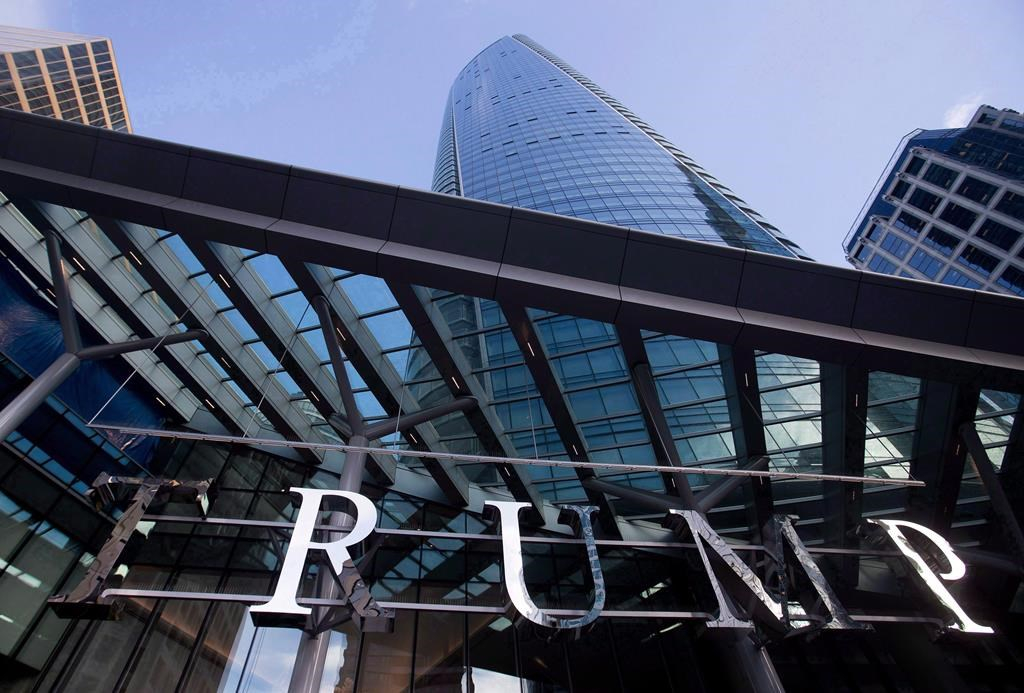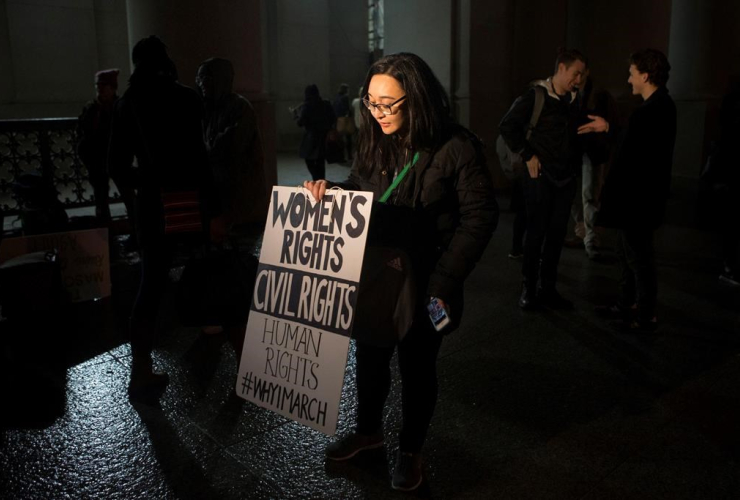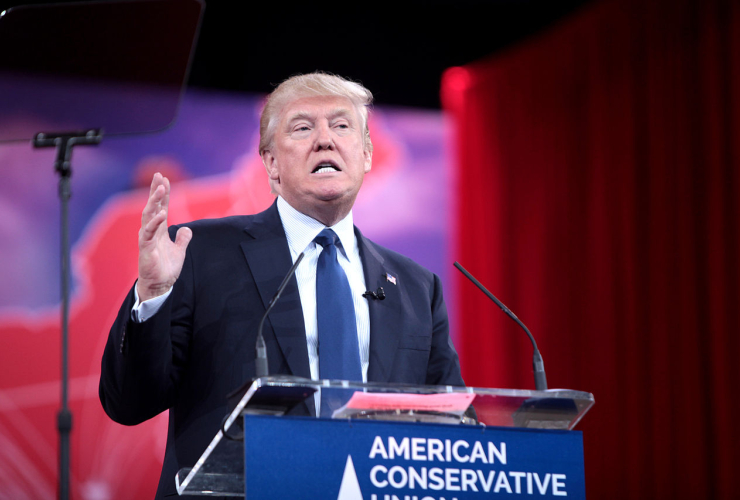Dozens of police and security guards surrounded the Trump Tower in Vancouver on Tuesday as protesters arrived in advance of the building’s grand opening. The building has become a focal point for demonstrations against U.S. President Donald Trump.
The $360−million hotel and condominium development, with a unique twisting design by late architect Arthur Erickson, had a soft launch last month. Trump’s sons, Donald Trump Jr. and Eric Trump, were scheduled to attend the grand opening of the 69−storey building.
Vancouver’s Trump International Hotel and Tower was built by developer Joo Kim Tiah, the president and CEO of Holborn Group, who is the son of one of Malaysia’s wealthiest businessmen. The Trump Organization does not own the tower, but licensed its name for branding and marketing, while the Trump Hotel Collection operates the 147−room hotel.
It has become a destination for protests over the president’s anti−immigrant rhetoric, comments about women and promises to build a wall to keep Mexican migrants out of the United States.
George De Young was outspoken about his opposition to the building’s namesake.
"Trump is very scary," said the Vancouver native, shaking his head. "I don’t like any show of acceptance for what Trump represents."
Henry Ho, also from Vancouver, had never been to a protest before but arrived in front of Trump Tower carrying signs that read "Dump Trump" and "Is it 2020 yet?"
"We’re not just going to be quiet and let things happen the way they are," said the 27−year−old self−described supporter of Democratic presidential nominee Hillary Clinton. "We will show that we can come together and aren’t divided by all the hate he spews out."
After Trump’s call in 2015 for a "complete shutdown" of Muslims entering the U.S., a petition urging Holborn Group to dump the Trump name attracted 56,000 signatures. Mayor Gregor Robertson wrote a passionate letter to Tiah in December 2015 urging that the name be dropped.
"Trump’s name and brand have no more place on Vancouver’s skyline than his ignorant ideas have in the modern world," Robertson wrote.
The building’s more than 200 condominium units reportedly sold out last year. Tiah told The Associated Press he’s now "locked" into his licensing agreement, with no legal grounds to back out of the deal, whose terms have not been released.
"There would be severe legal implications," he said in a recent interview.
The 37−year−old has a picture on Instagram of himself at Trump’s Jan. 20 inauguration, along with a picture of his ticket for the Liberty Ball, one of three balls the president attended. TA Global reported it earned US$10.4 million from the Vancouver Trump project in 2015, representing 57 per cent of its total profit.
In his recent interview with the AP, Tiah says he found Trump’s statements about Muslims, Mexicans and women "extremely stressful."
"I did a lot of soul searching because people were attacking me for it," said Tiah.
He says he chose the Trump brand in part because he felt a bond with Trump’s son Donald Jr.
"We’re both the oldest son and our fathers were really dominant and difficult at times," he said. "We may be OK financially but we didn’t get the attention of our parents because our parents were always busy working. But at the same time there’s a big expectation to be perfect."
Some experts are now expressing doubts about the fate of the newest addition to the city's skyline thanks to billionaire businessman Donald Trump's polarizing behaviour as president of the United States.
Simon Fraser University's Lindsay Meredith predicts Trump's actions, which include a foiled executive order to ban visitors from seven majority-Muslim nations as well as lewd comments about women that surfaced during the presidential race, will take a toll on the bottom line of his luxury hotel brand.
"We know it takes a long time to build brand awareness and brand value, and we know you can blow it away in seconds flat if you're not careful," Meredith, who teaches marketing at the Vancouver-area university, said Monday.
"Any CEO better give his head a shake if he thinks he can get away with doing or saying absolutely anything and that there's not going to be repercussions for either the corporation or the many brands that it encompasses."
Meredith explained how powerful a hotel's reputation can be, regardless of how well it is run, especially when serving an extremely affluent clientele, which he described as "the 0.1 per cent." He likened the business of catering to the ultra rich as an intricate dance, where the slightest misstep could mean disaster.
"You can't afford to have errors when you're dealing on this really, really high-end markets. All the pieces have got to work well. You can't just have an outstanding hotel. it's got to have a crystal-clean image as well," he said.
"Any bad service — it doesn't matter whether it's the parking valet, it doesn't matter whether it's the reservation — any one little piece when you're dealing with the very, very high end basically becomes an intolerable screw-up."
Fellow Simon Fraser University business Prof. Steven Kates offered a different opinion, speculating that the Trump brand wouldn't suffer thanks to the ambivalence of the hotel's target market, or even their outright support.
"I don't think the effect on the Trump brand will be all that profound, unless there's a major scandal and people actually turn against him," Kates said. "And considering what he's done in the past, that's not happened, so in the future it's hard to imagine a scenario under which he would lose his broad base of support."
June Cotte, a marketing professor at Western University's Ivey Business School in London, Ont., said that while the greater public may not be able to afford to stay at a Trump hotel, they can still have a powerful impact on the enterprise.
"The high-end, exclusive clientele does not necessarily want to deal with protests and demonstrations and police presence, etc. They're usually looking for a discreet, high-end experience," Cotte said. "If I'm going to choose between another luxury brand, like a Four Seasons, for example, and a Trump brand, why wouldn't I choose the one that does not have riot police in front of the property?"
In terms of reversing a negative image, Cotte said undoing damage is especially challenging when the brand is attached to a particular person, as is the case with Trump. She pointed to Martha Stewart as another example, citing the lifestyle guru's fall from grace following a conviction for insider trading, and the painstaking effort to rebuild.
"Given the level of public interest in (Trump) right now, I don't think that would be easy," Cotte added. "I think people would label a rebranding effort as sort of a sham."




Comments